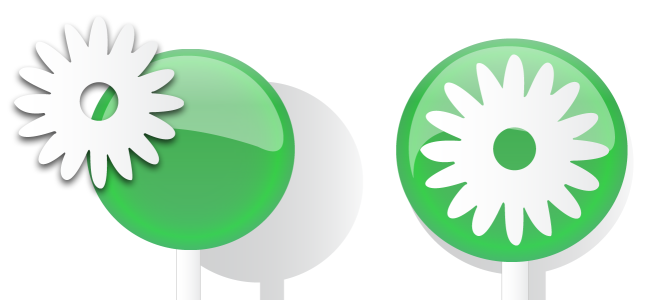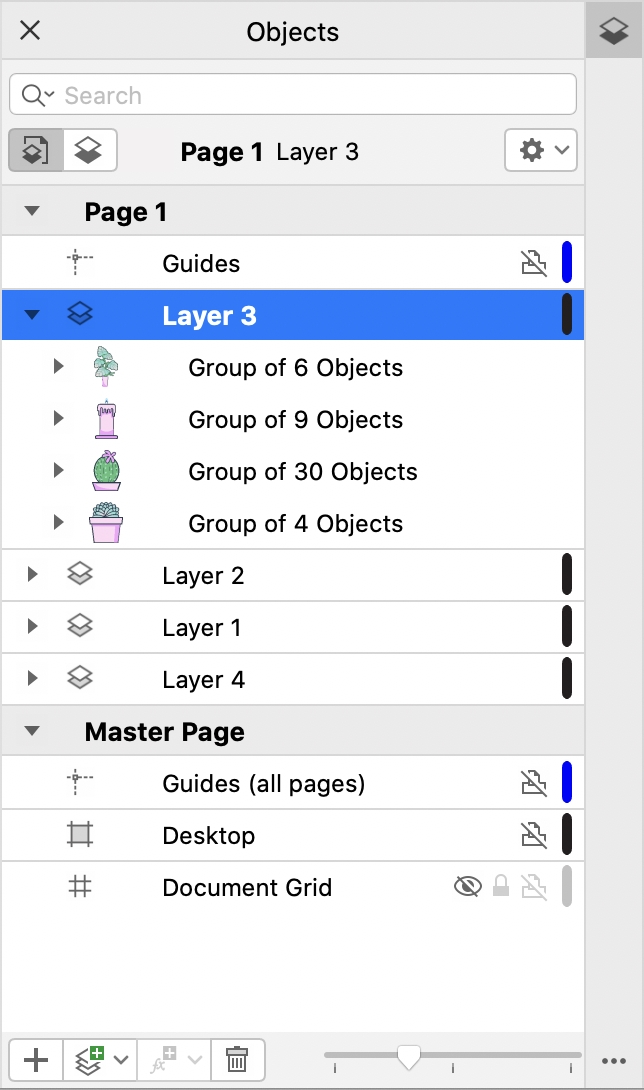Create layers
All CorelDRAW drawings consist of stacked objects. The vertical order of these objects — the stacking order — contributes to the appearance of the drawing. An effective way to organize these objects is by using invisible planes called layers.
Drawings can be assembled by placing objects on various levels or layers.
Layering gives you added flexibility when you organize and edit the objects in complex drawings. You can divide a drawing into multiple layers, each containing a portion of the drawing’s contents. For example, you can use layers to organize an architectural plan for a building. You can organize the building’s various components (for example, plumbing, electrical, structural) by placing them on separate layers.
Local layers and master layers
All content is placed on layers. Content that applies to a specific page is placed on a local layer. Content that applies to all pages in a document can be placed on a global layer called a master layer. Master layers are stored on a virtual page called the Master Page.
The Objects inspector displays the default layer structure. The names of the active page and layer appear at the top.
You can create master layers for all pages, for even pages, or for odd pages. For example, placing content on an even master layer means that the content will appear on all even pages but not on the odd pages.
Each new file is created with a default page (Page 1) and a Master Page. The default page contains the following layers:
The Master Page is a virtual page that contains the information that applies to all pages in a document. You can add one or more layers to a master page to hold content such as headers, footers, or a static background. By default, a master page contains the following layers:
The default layers on the master page cannot be deleted or copied.
To add content to a layer, you must make it the active layer.
You can delete selected local layers. If a document contains layers that do not contain any content, you can delete them all at once to reduce clutter.
To create a layer
To use a layer in the drawing, you must first make the layer active by clicking the layer name in the Objects inspector. When you start a drawing, the default layer (Layer 1) is the active layer.
Master layers are always added to the master page. Content added to these layers is visible on all pages of the document, all odd pages, or all even pages, depending on the type of master layer that you have chosen.
Master layers for odd and even pages cannot be created in Facing Pages view. If you have created odd and even master pages before switching to Facing Pages view, the odd and even master layers will be converted to all-page master layers. For more information about facing pages, see To view facing pages.
You can also add a layer by clicking the New Layer button in the Objects inspector.
You can also create new master layers by opening the flyout at the bottom of the Objects inspector and clicking the respective button: New Master Layer (all pages) , New Master Layer (odd pages)
, or New Master Layer (even pages)
.
You can make any layer a master layer by Control-clicking the layer name, clicking Change Layer To, and choosing Master Layer (all pages), Master Layer (odd pages), or Master Layer (even pages).
To make a layer active
By default, the active layer is Layer 1.
The name of the active layer and the type of the currently selected object appear on the status bar at the bottom of the application window. The names of the active page and layer also appear at the top of the Objects inspector.
If you don’t want to activate layers by selecting objects that reside on them, click the Options button , and click Select Object to Activate Layer to disable the command.
To delete a layer
When you delete a layer, you also delete all the objects on it. To preserve an object, move it to a different layer before you delete the current layer.
You can delete any unlocked layer except the following default layers: Document grid, Desktop, Guides, and Guides (all pages). For more information about locking and unlocking layers, see To set the editing properties of a layer.
You can also delete a layer by Control-clicking the layer name in the Objects inspector and choosing Delete.

